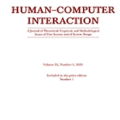Nearly two decades after its inception as a workshop at the ACM Conference on Human Factors in Computing Systems, NIME exists as an established international conference significantly distinct from its precursor. While this origin story is often noted, the implications of NIME's history as emerging from a field predominantly dealing with human-computer interaction have rarely been discussed. In this paper we highlight many of the recent -- and some not so recent -- challenges that have been brought upon the NIME community as it attempts to maintain and expand its identity as a platform for multidisciplinary research into HCI, interface design, and electronic and computer music. We discuss the relationship between the market demands of the neoliberal university -- which have underpinned academia's drive for innovation -- and the quantification and economisation of research performance which have facilitated certain disciplinary and social frictions to emerge within NIME-related research and practice. Drawing on work that engages with feminist theory and cultural studies, we suggest that critical reflection and moreover mediation is necessary in order to address burgeoning concerns which have been raised within the NIME discourse in relation to methodological approaches, `diversity and inclusion', `accessibility', and the fostering of rigorous interdisciplinary research.
翻译:作为计算机系统人的因素问题ACM会议的一个讲习班,NIME作为计算机系统人的因素问题ACM会议成立近20年之后,NIME作为一个既定的国际会议存在,与它的前身大不相同。虽然人们经常注意到这一起源故事,但很少讨论NIME历史从一个主要处理人与计算机相互作用的领域产生的影响。在本文件中,我们强调NIME社区最近 -- -- 有些不是最近 -- -- 遇到的许多挑战,因为它试图维持和扩大它作为HCI、界面设计、电子和计算机音乐的多学科研究平台的特性。我们讨论了新自由主义大学的市场需求 -- -- 支持学术界的创新运动 -- -- 与研究成果的量化和生态化之间的关系,后者有助于在与NIME有关的研究和实践中出现某些纪律和社会摩擦。我们建议,根据与女权主义理论和文化研究有关的工作,有必要进行批判性思考和调解,以便解决在NIME讨论方法、`多样化和包容性'、`普及性'和增进学科研究的严格性方面提出的紧迫问题。我们讨论了新自由主义大学的市场需求之间的关系。




